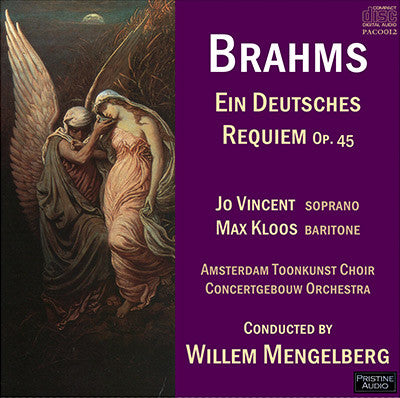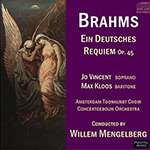
This album is included in the following sets:
This set contains the following albums:
- Producer's Note
- Cover Art
Fabulous wartime Brahms Requiem from Holland
Mengelberg's live 1940 performance in a superb sonic make-over
Brahms' German Requiem, given its first full performance in Leipzig in
1869, began life over a decade earlier in sketches for a projected first
symphony, which became the first Piano Concerto. It is unclear whether
the death of Brahms' great friend and mentor, Schumann, became the
original impetus for the work; what is clear is that the death of his
mother in 1865 inspired the composer to put his full effort into the
work.
A first performance in 1867, of the opening three
movements, was not a great success - the playing was poor and it was
badly received. Five months later a six-movement version, then intended
to be complete, was given in Bremen Cathedral with the composer
conducting, and his father, and friends Clara Schumann and the violinist
Joachim amongst those present in what was a deeply moving event. The
fifth movement was then added, giving a symmetry and balance to the
whole piece.
At the age of thirty-five, Brahms was finally fully
established as a composer with the success of this piece, and the
proclamation made many years earlier by Schumann, that in Brahms the
world had a worthy successor to Beethoven, began to look possible.
The
text is not drawn from the Catholic Mass, as with a majority of Requiem
Masses set to music at this time; Brahms instead drew on Luther's
German Bible to produce a text designed to console and inspire the
living, rather than offering prayers to the dead. (See below for links
to further detailed information about this piece)
This
recording, made onto acetate 78rpm discs by a Dutch radio station in
1940, was one of a number of Mengelberg's live output that has survived
reasonably well. I say reasonably, as the recording itself was
originally very good, but wear and tear of the delicate and unique disc
surfaces in the twenty years prior to their transfer to tape and then LP
had caused significant damage.
Only very recently has the
technology become available to correct the problems inherent in the
original discs, and by the slow and painstaking application of new
restoration techniques we are now able to present this wonderful
recording in a sound quality far superior to anything heard before.
Andrew Rose
Bill Rosen's Review
There are moments of great choral climaxes in Parts II and VI that are as great or greater than I've ever heard them
The Brahms German Requiem has been close to my heart ever since, as a
college freshman, I sung in it at age 19. We rehearsed it for eight
months under Hugo Strelitzer, an exile from the Nazis who had been an
aide to Richard Strauss. Strelitzer had often prepared the Requiem for
Strauss to conduct; he made it clear that he thought little of our
efforts. We turned to Brahms for solace.
One wonders what
Strauss would have thought of Mengelberg's performance. They were close
and admiring friends. On the one hand, Mengelberg's German Requiem is a
great and a magnificent performance even with the usual Mengelberg
quirks; there are moments of great choral climaxes in Parts II and VI
that are as great or greater than I've ever heard them. On the other
hand, Mengelberg has stuck a knife in his artistic creation that has
wounded but not killed it. More anon.
I Selig Sind
The opening movement is very good, but not great, due to Mengelberg's
typical tempo instabilities. Because of this, the beautiful modulation
at "Sie gehin hin" does not make as great an impact as it could. Still,
there are many beautiful moments.
II Denn alles Fleisch
The opening funeral march is remarkably steady and the choral
fortissimo is shocking and very clear. The trio is lovely and the repeat
of the funeral march is archingly beautiful and forward in movement.
The Handelian fugue that follows is one of the greatest things I've
heard from Mengelberg: entries strong and brilliantly clear;
counterpoint dazzling. Have I ever heard it this good before? And then,
suddenly, it's OVER. I can't believe it. A small poisonous doubt creeps
in--can he have cut it? I don't have a score and I check timings with
other performances and it's within the time limits, so I let it go.
III Herr, lehre doch mich
A superb baritone, Max Klos, opens with "Lord, let me know mine end"
and the chorus is very beautiful in consoling him. And then Mengelberg
does what no other conductor, not even Furtwangler, Toscanini or
Klemperer has done: he conducts the usual murky pedal fugue as if it
were Mozart with great clarity and beauty. Every strand is clear; the
choral fugue above and the unyielding orchestral pedal below. A
magnificent accomplishment.
IV Wie lieblich
This acme of sweetness, this bob-bon is superb and the little contrapuntal acid in the middle cuts it very well.
V I habt nun Traurigkeit
Jo Vincent is not Elizabeth Schwartzkopf in the 1947 Karajan recording of the Requiem and that says it all.
VI Denn wir habel
The great climax of the Requiem. Again Max Klos (nearly equal to Hans
Hotter) opens and Mengelberg creates great mystery and suspense. The
mood finally breaks into tempestuous choral fury. The Pristine Audio
restoration has performed a real miracle here. The choral power is "in
your face"! The final "Death, where is thy sting?" is thrown out like
hammerblows from heaven. I have never heard it with such power. I
understand Strelitzer's contempt for our puny efforts.
Then
the great Handelian fugue begins: "Thou art worthy, o Lord" and again
Mengelberg's mastery of chorus and orchestra is a thing to behold:
clarity, power, unstoppable momentum. And it STOPS!
And I know,
beyond the shadow of a doubt, that he has made a large cut! I search on
the Internet and find two references to large cuts in the 6th movement.
What can one say to such an unbelievable, arrogant artistic blunder?
Cuts have been made to works, of course, to sections that were too long
or where inspiration lagged. But to cut Brahms at the acme of his
inspiration and Mengelberg at the height of his recreation? To me it is
incomprehensible. It suggests to me that Mengelberg's great genius was
mixed with considerable arrogance, that he did not feel as Schnabel did
that "the music is always better than we can perform it".
VII Selig sind
Strong, heavy. It is perhaps now WE who need the consolations of the Requiem.
It is obvious that I feel strongly about the cuts. Even so, this is a
magnificent performance of the German Requiem with miraculous sound
especially in the fortissimo choral pssages. I cannot forbear to listen
to it, even while I realize that Mengelberg lacked the artistic
greatness of a Schnabel, a Toscanini or a Furtwangler.
Reviewer: Bill Rosen

